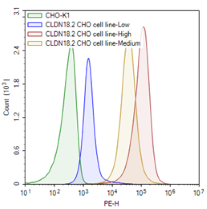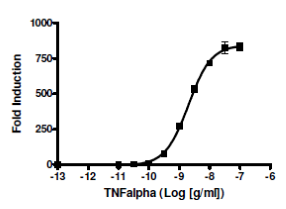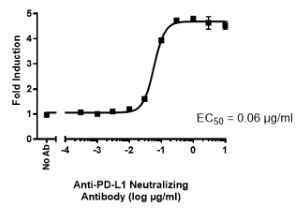Custom Cell Line Development
Cell lines can be engineered to enable a variety of research and development applications, such as protein production, pathway analysis, inhibitor/activator studies, cellular controls for antibody staining, CAR-T modeling, high-throughput screening systems and much more. Our expert scientists will help you optimize your time and efforts by providing stable cell line development services to advance your research goals. Our expertise in the generation of cellular reporter assay systems and knockout or overexpressing cells provides excellent custom resources to meet your desired specifications.
We also offer CRISPR/Cas9 technology to express a protein of interest within the AAVS1 safe-harbor site of chromosome 19. This avoids the adverse effects resulting from random integrations into the cellular genome, eliminating off-target effects.
Our Deliverables to You
- Multiple stable clones for your evaluation
- 30+ parental cell lines to choose from or provide your own for engineering
- Products that meet specifications, i.e., expression levels, functional activity, robust outputs, etc.
- Direct, consistent communication with experienced development scientists.
Cell lines can be engineered to enable a variety of research and development applications, such as protein production, pathway analysis, inhibitor/activator studies, cellular controls for antibody staining, CAR-T modeling, high-throughput screening systems and much more. Our expert scientists will help you optimize your time and efforts by providing stable cell line development services to advance your research goals. Our expertise in the generation of cellular reporter assay systems and knockout or overexpressing cells provides excellent custom resources to meet your desired specifications.
We also offer CRISPR/Cas9 technology to express a protein of interest within the AAVS1 safe-harbor site of chromosome 19. This avoids the adverse effects resulting from random integrations into the cellular genome, eliminating off-target effects.
Our Deliverables to You
- Multiple stable clones for your evaluation
- 30+ parental cell lines to choose from or provide your own for engineering
- Products that meet specifications, i.e., expression levels, functional activity, robust outputs, etc.
- Direct, consistent communication with experienced development scientists.
Cell Line Formats
Overexpression
- Positive control for antibody or ligand screening
- Target for CAR-T, BiTE or antibody killing
- Study protein expression effects on cell signaling, proliferation, metabolism, etc.
- Varying expression levels (high, medium, low) to mimic natural variations
Reporter
- High throughput screening tool to identify receptor/pathway inhibitors
- 25+ available promoters and 30+ parental cell lines
- Customize with your gene promoter of interest
- Luciferase, eGFP, or custom reporter systems
Knockout
- CRISPR/Cas9 genome editing ensures stable knockout condition
- KO of immune-mediators such as TCR, B2M and CIITA for universal CAR-T cells
- Study protein KO effects on cell signaling, proliferation, metabolism, activation, etc.
Co-stimulatory
- For use in co-culture with reporter cells
- High throughput inhibitor screening
- TCR activator + customized expression of co-stimulators or checkpoint inhibitors
CAR-T Cells
- Expression of your CAR on immune-derived or other cell lines to model CAR-T function in co-culture studies
- Cell lines or primary CD4+/CD8+ T cells
Bioluminescent
- Constitutive expression of luciferase or eGFP for use in cell line-derived xenograft models or other cell tracking experiments
- Clonally selected for uniformity, providing consistent results
- Can be engineered for protein overexpression or KO.
Available Promoters
We can design custom cell reporter systems to meet your requirements. Select a promoter from our current offerings below or use your desired promoter. We will construct a plasmid with a reporter such as luciferase, eGFP, or other protein/enzyme to engineer responsive target cells customized for your research.
AP-1, ARE, CRE/CREB, FOXO, Foxp3, GAL4, GAS, Gli, IL-2, IL-8, ISRE, Myc, NFAT, NF-κB, Notch1/CSL, PAI-1, SRE, STAT3, STAT5, TCF/LEF, TEAD, TGF/SMAD, RARα, RARβ, RARγ
A Milestone-Measured Process to Ensure Success
Molecular Biology
Expression vectors will be generated using publicly available cDNA clones or using custom synthetic DNA to stably transfect the gene of interest.
Selection & Pool Generation
Parental cells will be transfected or virally transduced with the chosen vector. The cell pool will be selected using antibiotics and phenotypically characterized.
Limiting Dilution & Clonal Selection
Based on the results of the initial pool testing, limiting dilution will be performed and single cell-derived clones will be selected.
Confirmation of Expression
The expression level of the target protein will be analyzed via Western Blot or flow cytometry.
Functional Validation
If applicable, cells will be treated with a reference control compound to obtain dose-response titration data. Alternatively, cells may be assayed in co-culture, depending on the objective of the project.
Stability Testing
The desired number of clones will be selected for passage stability testing. Mycoplasma testing and cell banking services are also available.
Molecular Biology
Expression vectors will be generated using publicly available cDNA clones or using custom synthetic DNA to stably transfect the gene of interest.
Selection & Pool Generation
Parental cells will be transfected or virally transduced with the chosen vector. The cell pool will be selected using antibiotics and phenotypically characterized.
Limiting Dilution & Clonal Selection
Based on the results of the initial pool testing, limiting dilution will be performed and single cell-derived clones will be selected.
Confirmation of Expression
The expression level of the target protein will be analyzed via Western Blot or flow cytometry.
Functional Validation
If applicable, cells will be treated with a reference control compound to obtain dose-response titration data. Alternatively, cells may be assayed in co-culture, depending on the objective of the project.
Stability Testing
The desired number of clones will be selected for passage stability testing. Mycoplasma testing and cell banking services are also available.
Validation Data Examples
Overexpression Confirmation

Flow cytometry using anti-claudin-18.2 antibody (#101565 and streptavidin-PE detects claudin-18.2 surface expression on CHO cells with different expression levels (#78533, high expresser: red; medium expresser: yellow; and low expresser: blue) were compared to parental CHO-K1 cells (green).
High Fold Induction

TNFα dose response in NF-κB HEK293 Cell Line. The results are shown as fold induction of luciferase reporter activity.
Neutralizing Antibody Activity

Determination of anti-mouse PD-L1 antibody EC50 in a co-culture assay with mouse PD-L1-expressing TCR Activator cells incubated with mouse PD1/NFAT reporter Jurkat cell line.
Overexpression Confirmation

Flow cytometry using anti-claudin-18.2 antibody (#101565 and streptavidin-PE detects claudin-18.2 surface expression on CHO cells with different expression levels (#78533, high expresser: red; medium expresser: yellow; and low expresser: blue) were compared to parental CHO-K1 cells (green).
High Fold Induction

TNFα dose response in NF-κB HEK293 Cell Line. The results are shown as fold induction of luciferase reporter activity.
Neutralizing Antibody Activity

Determination of anti-mouse PD-L1 antibody EC50 in a co-culture assay with mouse PD-L1-expressing TCR Activator cells incubated with mouse PD1/NFAT reporter Jurkat cell line.
Quote Request
Inquiries
│Related Services
│Related Products
- Cell Lines & Primary Cells
- Cell Media & Luciferase Reagents
- Cell-Based Assay Kits
- Cell Isolation Kits

